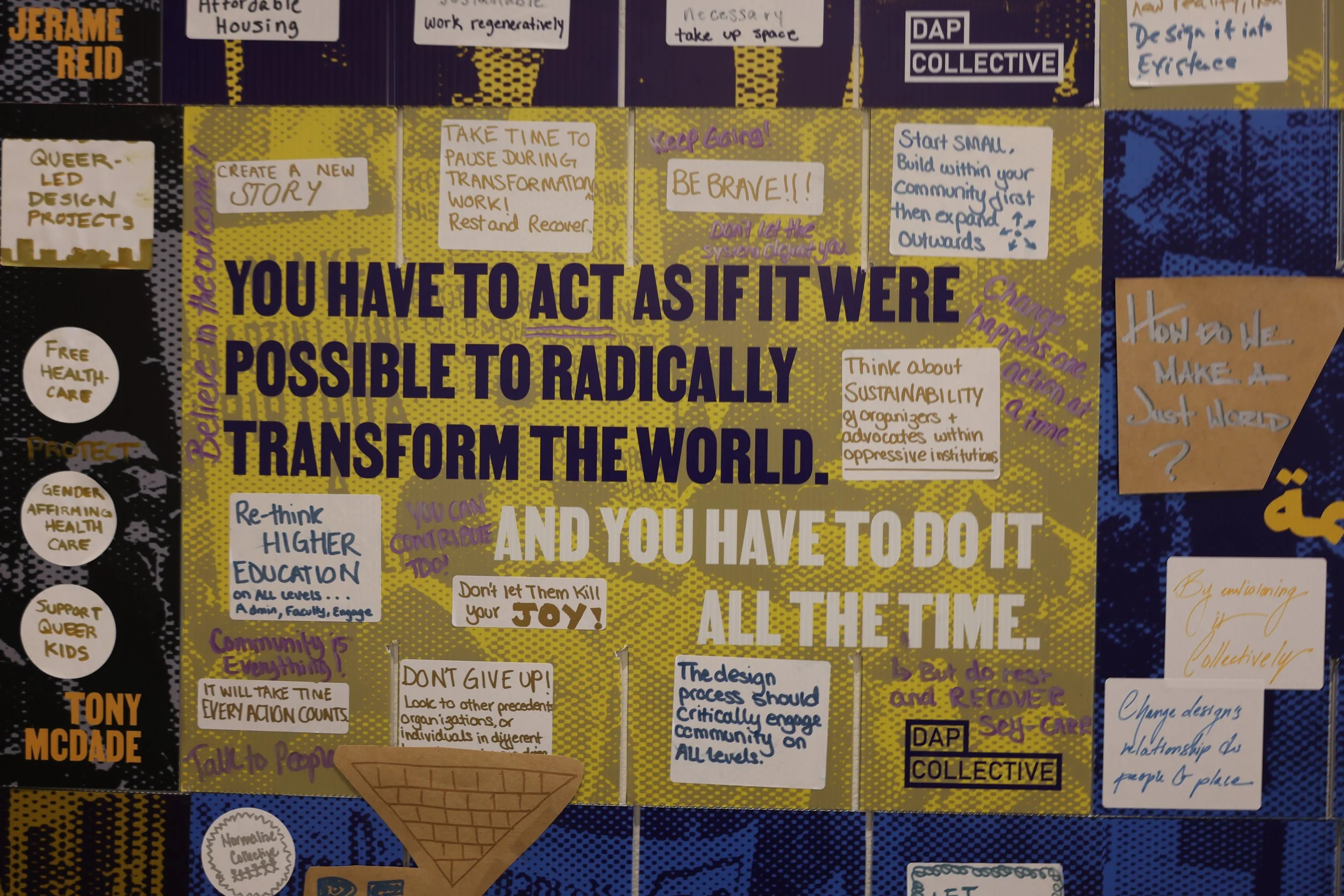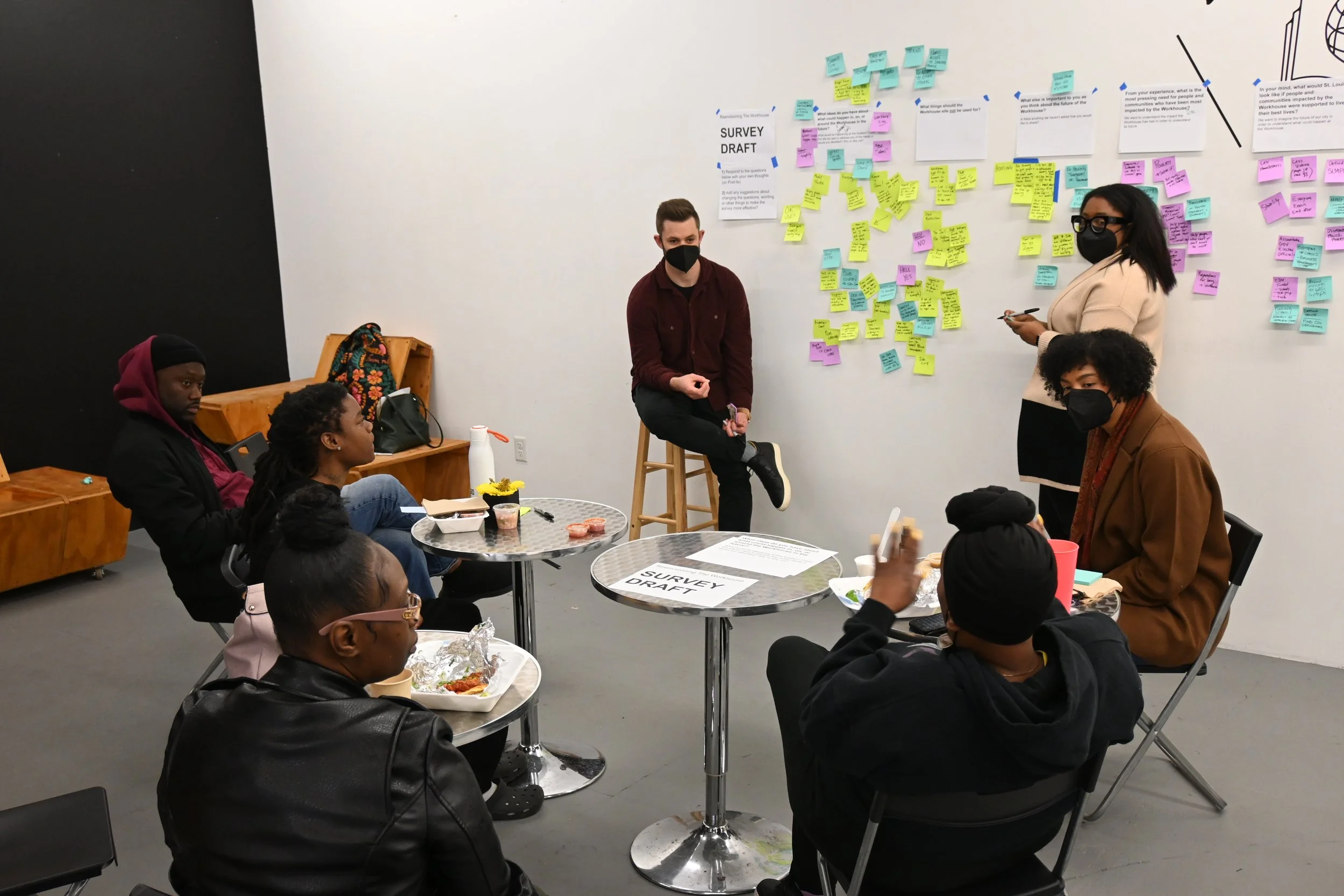DESIGN JUSTICE TRAINING
The design of our built environment is the lasting physical result of policies, procedures, and practices that shape and inform the degree to which our spaces and places care for, harm, or abandon the people who are impacted by them.
Given the lasting permanence of our work, we must pay particular attention to the injustices that result from our work and seek to dismantle the privilege and power structures that use the design professions to maintain systems of injustice in order to envision spaces of radical justice and liberation.
COLLOQATE’S DESIGN JUSTICE TRAINING SESSIONS EXPLORE THE PRIVILEGE AND POWER STRUCTURES THAT HAVE DEFINED INJUSTICE IN THE BUILT ENVIRONMENT FROM AMERICA’S INCEPTION.
We will look at the history of the design justice movement, and explore how this theory of practice enables us to continually challenge power ecosystems that use architecture and design to create oppressive conditions throughout the built environment.
IS THIS TRAINING FOR YOU?
These trainings are not intended to take the place of general Diversity/Equity/Inclusion/Justice workshops.
While there are certainly overlapping concepts and vocabulary, our focus is specific to the spatial design industry and the organizations, institutions, and individuals that interface with spatial design. This includes:
Architects, landscape architects, interior designers, planners, etc. Environmental graphic designers, experiential designers, etc.
Engineers including MEP, civil, structural, transportation, etc.
Organizations, institutions, or communities that steward land resources and seek to create built space.
Owner’s representatives & project managers.
-
Colloqate offers a series of four trainings: DJ101, DJ201, DJ301, and DJ401. Each of these trainings could be scheduled as:
A one day session. 7 hours with breaks. Typically, 3 hours before lunch and 3 hours after lunch.
A two day session. 3.5 hours on each day with breaks.
All sessions are highly interactive. Together, participants will reflect on their participation in current power structures and systems of injustice and imagine new opportunities. After the workshop, the Colloqate team will provide summary materials from the session to allow teams to revisit the content and consider their own action plan.
-
1. Introductions / Icebreaker
2. Community Agreements
Collectively define how we will agree to treat each other
3. Core Concepts
Core Definitions, Questions, and Principles of Design Justice
4. Groundsetting
Work through our own relationships to power and systems to set the groundwork for creative exploration that is based in an anti-racist approach.
Inquiry - QuestionStorm around radical questions that will be specifically created around work relevant to workshop participants.
Unjust Timelines - History and context ground the relationship between race, place, and oppression.
5. Structural Framework
Signal and Receiver - Break down power within the design profession into its component parts.
System Mapping - Deconstruct a relevant system into its component parts, injustices, and impacted communities. Explore desired outcomes within that context and understand opportunities and barriers.
6. Core Questions
Explore 5 core questions to lay out the issues impacting a project’s communities, identify the power structures at the root of those issues, name those most impacted, understand how the built environment perpetuates the issue, and imagine new opportunities through design.
-
1. Introductions / Icebreaker
2. Community Agreements Review
3. Inquiry
QuestionStorm around new radical questions that will be specifically created around work relevant to workshop participants. This will support an inquisitive mindset throughout the workshop.
4. Review
Reconnect to concepts from previous workshops.
5. Journey Mapping
Map the journey of a stakeholder who is directly and disproportionately impacted by a decision made during the project process.
…and/or…
5/6. Exploring Our Power
Status Quo to Liberation - What are forms and degrees of action? What is their impact on a scale from status quo to liberation?
Goals, Barriers, Efforts, and Tactics - Explore specific goals to reach justice and liberation. What are the barriers? What is being done? What new tactics and resources are needed?
10% Solutions - What is within our capacity to do right now?
-
Design Justice is what love looks like in public space.
1. Introductions / Icebreaker
2. Community Agreements Review
3. Review
Reconnect to concepts from previous workshops
4. Exercises TBD – In Collaboration with Community!
This session is co-created with community stakeholders who initiate topics and conversations that they feel are most relevant and timely for workshop participants to be working through.
5. What Does it All Mean?
Reflect on what this means for us as [architects / organizers / institutional employees / engineers / contractors / etc.]
Note: The majority of attendees must have participated in a 101 + 201 training previously. For any attendees who have not participated in any prior Design Justice training, this workshop will require an intermediate level of familiarity with concepts such as systemic racism, differentiating equity vs. equality, positionality, and an ability to situate oneself within complex socio-political systems. This training is not well suited for folks who have never explored these topics before.
-
1. Introductions / Icebreaker
2. Community Agreements Review
3. Review
Reflect and reconnect to concepts from previous workshops
4. Reading Space
How are power structures and cultural norms embedded in and perpetuated by the spaces we create? How are justice or injustice reaffirmed?
5. Spatial Implications
How do community priorities, culture, and identity define the spatial outcomes? What is the impact?
6. Design Workshop
Let’s have some fun!
Note: Attendees must have participated in 101, 201, and 301 training previously. This workshop will require an intermediate level of familiarity with concepts such as systemic racism, differentiating equity vs. equality, positionality, and an ability to situate oneself within complex socio-political systems.
COMMUNITY DESIGN ADVOCATES & ORGANIZERS TRAINING PROGRAM
Community voice is an integral part of the design of every city and neighborhood. The Community Design Advocates & Organizers program was first created to deepen our connection and responsiveness to the communities that are impacted by the projects we work on.
In order to truly design with communities, it is imperative for design teams to work with the expertise of community members from start to finish. It is also important that we pay people for their time and labor, breaking the industry tradition of extracting information from communities with no guarantee of accountability.
Whenever possible, we recruit and work with a cohort of CDA/Os on our projects. As members of our team, we share organizing strategies, training in Design Justice principles, tools to use in their own engagement activities, material budgets for supplies to facilitate those activities, and regular team processing and planning sessions to facilitate their work.
COLLOQATE WORKS WITH COMMUNITY DESIGN ADVOCATES & ORGANIZERS ON NEARLY EVERY ONE OF OUR PROJECTS.
NOW, WE ARE PREPARING TO EXPAND…
We have seen the power of organizing with CDA/Os on projects. We know that this approach leads to places that meet the needs and aspirations of equity-seeking communities. We have also seen the limitations, and heard from CDA/O alumni about the challenges of learning how to organize and advocate, while also learning about how architecture works and how decisions get made.
That’s why we are focusing on developing and funding a stand-alone CDA/O Training Program! We are currently designing the curriculum with generous support from Meyer Memorial Trust, and fundraising to launch this paid program in 2026.
If you, your firm, or your organization are interested in how you can invest in this program, use the contact form below.
CURIOUS ABOUT OUR PROGRAMS?
Whether you are interested in a Design Justice Training, Community Design Advocates & Organizers, or some other kind of partnership, we would love to hear from you!
If you are doing work similar to ours and we haven’t met yet, please reach out! We love to share notes. We always choose cooperation over competition.



